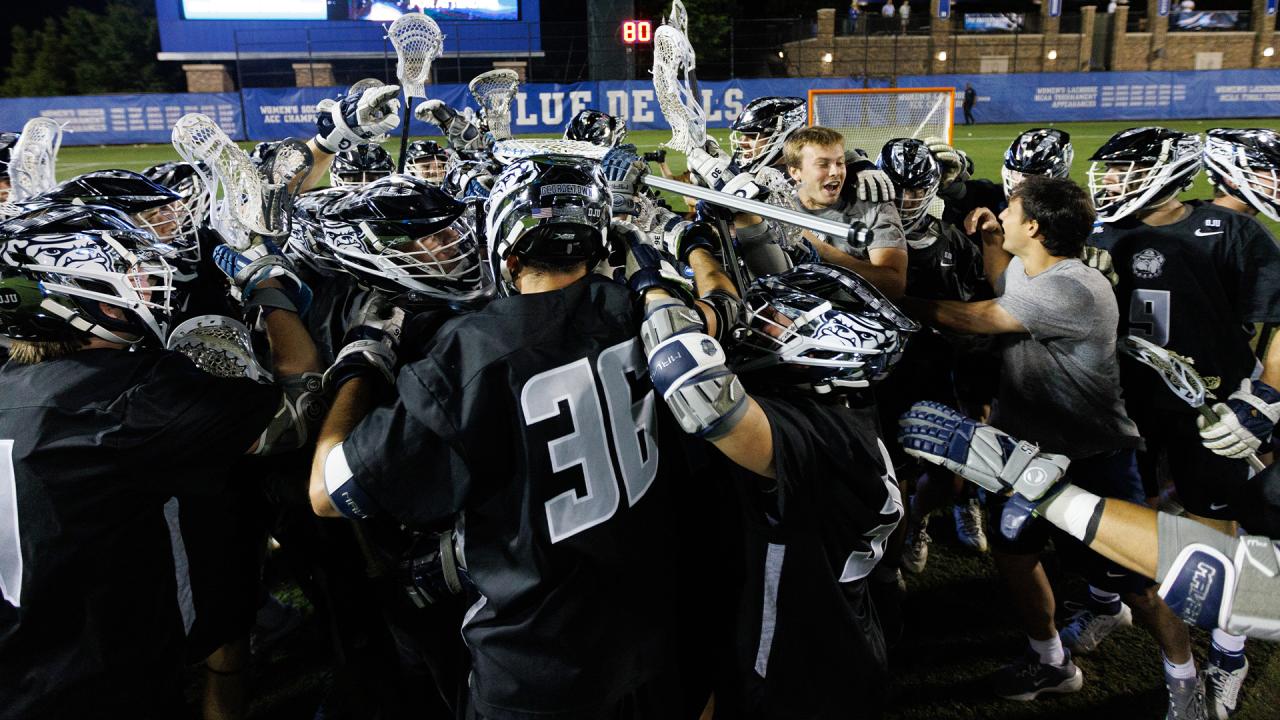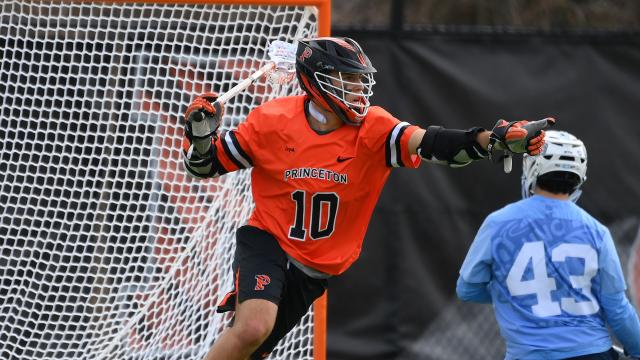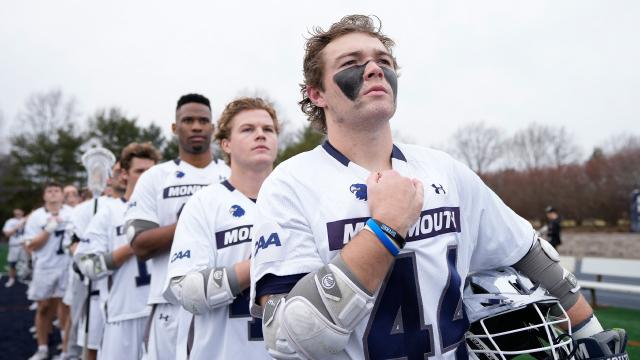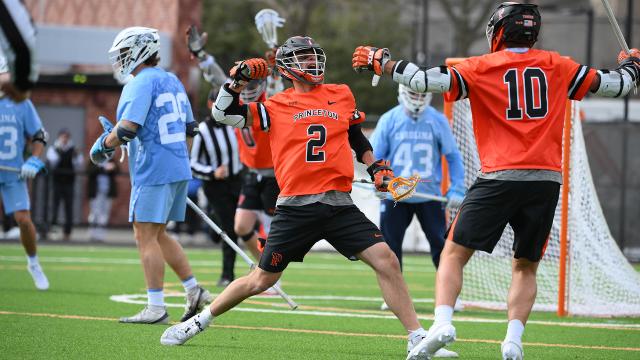
Patience Pays Off for Georgetown 'Cornerstone' Seamus Foley
There is a hypothetical question Seamus Foley isn’t quite sure how to answer.
The Georgetown defenseman played sparingly for two years, then was a man-down specialist in 2023. He began last season as the team’s fourth defenseman, only to get nudged into a starting role when Will Tominovich suffered a season-ending injury in the Hoyas’ opener.
Does Foley bother to apply for a medical hardship waiver for a fifth year if he isn’t a regular last year? Hard to say.
Here’s what much is easier to know: The Hoyas (12-4) are grateful he did as they head into Sunday’s NCAA quarterfinal against second-seeded Maryland (12-3) in Annapolis, Md.
“He’s the cornerstone of our defense,” freshman defenseman Robert Plath said. “Every call usually begins and ends with Seamus. As an incoming freshman and especially one who’s coming into such a highly complex defense like ours, it was definitely very difficult to get my feet on the ground initially. Seamus definitely helped facilitate my growth as a player. On-ball, off-ball, everything. He just made everything a lot slower in a very fast-paced game.”
The 6-foot-4, 200-pounder is from a decidedly non-traditional lacrosse area: Minnesota. His older brother by seven years played youth lacrosse in Minneapolis, and like so many younger brothers, he figured it was something to emulate.
It also provided a natural segue from the end of hockey season. There would be a few weeks of practice indoors, and then things would move outside as soon as most of the snow melted away.
“It’s also so new in Minnesota and not having it be my dad’s sport,” Foley said. “I grew up playing hockey as well and my dad growing up in Minnesota was surrounded by hockey, so being able to set my path in lacrosse is something that drove me toward the sport.”
Georgetown spotted him during club tournaments and was impressed with his range and long arms. Foley wound up earning an Under Armour All-American selection in 2020, though the combination of the pandemic and double hip surgery that May set back his progression a bit.
It’s hard not to see a parallel between Foley and Aidan Carroll, the Hoya attackman who gradually went from scout-teamer to second line midfielder to the central figure of the team’s offense. Carroll didn’t play much until his third year in the program.
For Foley, it took four.
“One week, I was down at the scout end having one role, and the next week we’re playing Hopkins, a great top-10 team that year,” Foley said. “It was a whirlwind, but I couldn’t have asked for much more; everyone comes here to play game in and game out, and not everyone’s process is the same.”
After last year’s 16-11 loss to Notre Dame in the NCAA quarterfinals, it dawned on Foley his career might be over. But encouraged by Hoyas athletic trainer Erin Pettinger, he started to seriously consider what might be required to stick around for an extra year.
The first step was reaching out to coach Kevin Warne, who was already staring at having one of his least experienced teams. Georgetown had deftly managed its roster throughout the years the sport was littered with players with COVID-era waivers, staying old while continuing to amass Big East titles.
Foley’s call the Thursday after the quarterfinal loss, then, was plenty welcome.
“He said, ‘Listen, there’s a chance,’ and I’m like, ‘Do it. It’s up to you. It’s your decision, but we’d love to have you back,’” Warne said. “Anytime you can have a returning starter and, selfishly, another defenseman who’s played 16 games, [you’re happy].”
Within weeks, Foley had found a graduate program, and the Hoyas had some semblance of defensive continuity with defenseman Ty Banks and goalie Anderson Moore also back for their sophomore years.
And for Foley, there was never a thought of using the hardship waiver to head to another program.
“This is where my heart was,” he said. “Too many of my closest friends have poured their heart and soul into this program and spent so much time here that I didn’t even want to go anywhere else. It was here or bust.”
Banks and Moore were first-team all-Big East picks, and Plath earned a second-team nod in his first season. Foley has proven every bit as important in building cohesion in the unit, as well as a sounding board for underclassmen still figuring things out.
Or, as Warne put it, Foley “breaks it down into simple terms, player-to-player terms.”
“Seamus is very, very cerebral,” Warne said. “He understands the defense and understands what we want to accomplish. He can get people on the same page. He’s a tough kid and has a good stick. He’s able to pick up the ball and knock down passes. He does all of the other things that are just as valuable as a guy who can cover the ball.”
And it has mattered greatly for the surging Hoyas, who are coming off a 16-12 victory at Duke in the first round, their first postseason road victory since 2003 and their first against a seeded team since 2000.
It has Georgetown again on the doorstep of its first semifinal appearance since 1999, and enhanced arguably the most fulfilling season of Foley’s career.
“In a lot of ways, it has been,” Foley said. “After that 7-3 Denver loss [on April 12], a lot of people outside our locker room and outside our program wrote us off. To see the way we’ve rebounded since in the last five games has been remarkable. That’s not all we can do and should do, and there’s more this group wants to achieve. When we play the way we know we can play, we can stand up with any program in the country.”
Patrick Stevens
Patrick Stevens has covered college sports for 25 years. His work also appears in The Washington Post, Blue Ribbon College Basketball Yearbook and other outlets. He's provided coverage of Division I men's lacrosse to USA Lacrosse Magazine since 2010.

Related Articles





